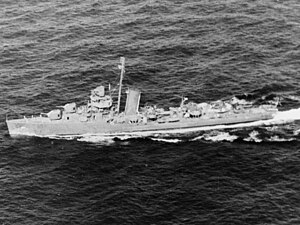| Battle of Vella Gulf | |||||||
|---|---|---|---|---|---|---|---|
| Part of the Pacific Theater of World War II | |||||||
 The U.S. destroyer Sterett. | |||||||
| |||||||
| Belligerents | |||||||
|
|
| ||||||
| Commanders and leaders | |||||||
|
|
| ||||||
| Units involved | |||||||
|
|
| ||||||
| Strength | |||||||
| 6 destroyers | 4 destroyers | ||||||
| Casualties and losses | |||||||
| None |
3 destroyers sunk, 1,210 killed | ||||||
The Battle of Vella Gulf (ベラ湾夜戦, Berawan yasen) was a naval battle of the Pacific campaign of World War II fought on the night of 6–7 August 1943 in Vella Gulf between Vella Lavella and Kolombangara in the Solomon Islands of the southwest Pacific.
This engagement was the first time that American destroyers were allowed to operate independently of the American cruiser force during the Pacific campaign.
In the battle, six American destroyers had intelligence that a Japanese group was coming to Vella Gulf on that night, and laid in wait for them. They engaged four Japanese destroyers and three cruisers attempting to reinforce Japanese troops on Kolombangara. The American warships put an island with mountains at their backs, because the Japanese could not discriminate ships from the island due to the poor quality of their radar. The group then closed the Japanese force undetected with the aid of radar, turned broadside in a line, and fired a full salvo of torpedoes. At the same time, they opened fire with main guns, and reloaded torpedoes and continued firing. They sank three Japanese destroyers, damaged two cruisers, and killed an estimated 3,100 Japanese sailors and soldiers. The American ships did not get hit by even a single bullet.